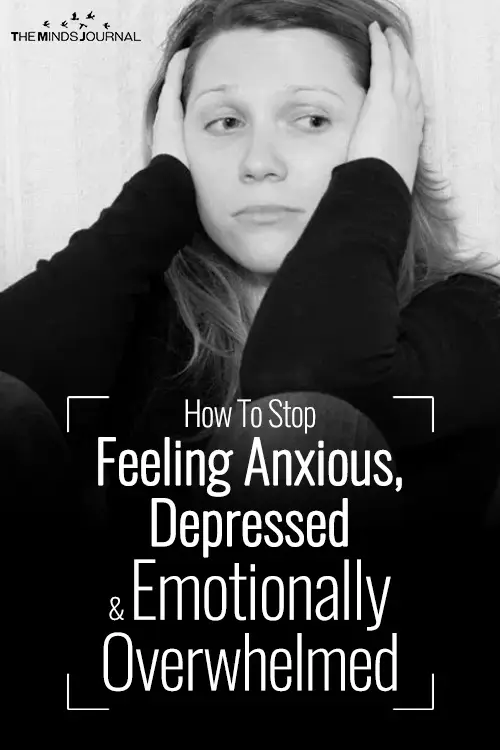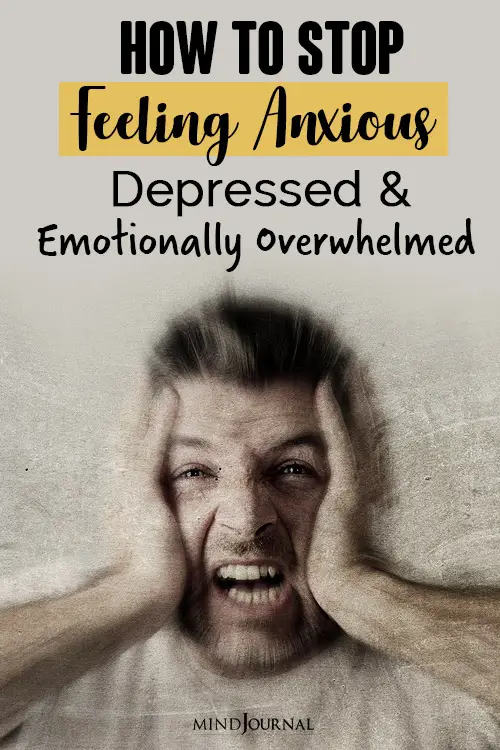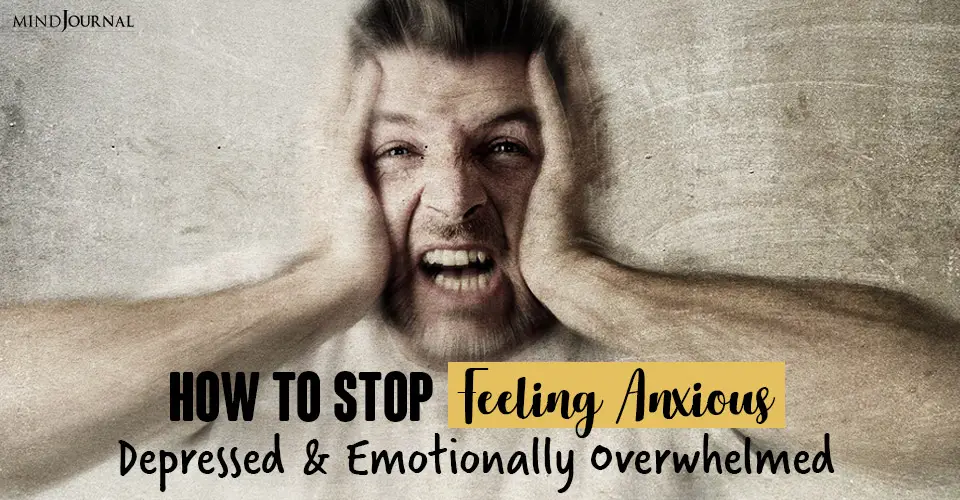Anxiety, depression, and mental health are constantly in the news. So what causes anxiety, depression, and the feeling of being overwhelmed? Why are we constantly feeling triggered? I have a completely different take on the cause of anxiety and depression, and how to stop feeling anxious and depressed naturally without drugs.
Many people incorrectly believe that depression is simply a medical condition that is out of their control.
However, knowing how to apply the correct knowledge and techniques to successfully resolve emotions as well as the problems triggering them can give you complete autonomy over your mental and emotional wellbeing.
What Causes Anxiety and Depression?
Having problems in your life which you don’t know how to solve, results in ongoing ruminations and negative thoughts of imagined outcomes which can lead to emotional reactions such as anxiety. Constantly thinking in this way can eventually result in depression as you practice the habit of engaging in a negative mental and emotional feedback loop.
When you are emotionally triggered, your prefrontal cortex shuts down which prevents you from thinking and communicating clearly. This can have a detrimental effect on your relationships with others, especially when you are feeling anxious, angry, frustrated, or disappointed and struggle to communicate what you perceive to be the problem. It can make you feel like there are invisible walls of resistance that are keeping you feeling separate and alone.
Stress hormones which flood your body when you’re emotionally triggered are distinctly uncomfortable so will often retrigger further emotional reactions.
Constantly feeling emotionally triggered can affect your perception of your mental health and overall sense of well-being. Emotional instability leads to mental instability, these are the prevailing factors that contribute to a person’s depressed, anxious, and overwhelmed state.
By solving the emotional problem you can naturally restore your mind and body to a place of calm.
Related: 10 Habits That Cause Low Self Esteem And Depression
Why Do My Emotions Overwhelm Me?
When you suppress emotions you automatically default to thinking about why you think you feel that way. This can quickly overwhelm you as you contemplate all that’s going wrong in your life and what you think it means. These thoughts then create an endless and depressing loop of negative thoughts and the related emotional reactions which continue to threaten your reason for existing.
Emotions that many people commonly suppress include anxiety, fear, anger, frustration, and disappointment. When you can’t see an answer to your problem or don’t resolve your emotions when they are triggered, it causes a negative thought and reactive emotion loop which makes you feel like you’re constantly on guard and easily triggered.
This is why it sometimes appears that emotion is intensifying. That’s generally not the case, it’s just that your point of focus is attracting similar thoughts which are triggering further emotional reactions.
A clear example of how to recognize being in an unresolved emotional state is feeling mentally and or emotionally overwhelmed.
If you want to stop feeling anxious, depressed, and emotionally overwhelmed, you need to consciously interrupt that habit of negatively contemplating your problems and focusing on what you don’t want to happen. This is because there is a filter in your brain called the Reticular Activating System (RAS) which sets its filters depending on what you are predominantly focusing your attention on – and then makes you notice more of that.
Which means the more you think about something, the more inclined you are to think about it, and the more related emotional responses are triggered!
Most of us are taught from a young age to suppress an emotional response when it’s triggered. This is what makes us feel isolated and depressed and prevents us from feeling connected with other people.
How Can I Be in Control of My Emotions?
To be in control of your emotions, you need to consciously take charge of your emotions whenever they are triggered. When an emotional response is unresolved, e.g. ignored, investigated, over-felt, over-examined, or suppressed in any way then you cannot feel calm and at ease. This is because the programs which regulate your heart rate, breathing, blood pressure, and relax your muscles are interrupted by stress hormones when an emotional response is triggered, and your body goes on high alert. This is why emotional reactions feel so intense and physically uncomfortable.
When you consciously resolve an emotional response by simply recognizing and allowing this natural biological reaction to take place, your body goes back into sync and your prefrontal cortex comes back online, which is why you immediately feel better. Then it’s a matter of correctly reprogramming your brain filter with the right information so you remain focused on creating what you want.
Conversely, whenever you choose to block an emotional response, you keep yourself in a depressed or anxious emotional state. This happens because you continue to be caught up in the biological stress responses of your brain. In this state, you can’t think clearly, you can’t feel good and your modes of thought and action are contaminated at an operational level because you cannot process any new information. This is what makes you feel overwhelmed to the point of giving up. You’ve disconnected yourself from reality.
Without understanding how to resolve an emotional response (so you can feel calm and easily redirect your thoughts) you will default between negative thoughts and the emotions triggered by those thoughts.
Related: Why You Need To Stop “Fixing” Your Emotional Suffering
Emotional Stability Is Key To Ending Depression
When an emotional response remains unresolved, it feels like you’re dialing in between two radio stations and only experiencing the static. This makes you feel separate, depressed, isolated, and alone, as you struggle to communicate meaningfully with others.
Our brain is designed to connect with others, yet we must make sure we are using its full capabilities, so we don’t go “offline” when we feel emotionally triggered. When we are triggered, our body language, facial expressions, and tonality reflect tension which has a repelling effect on others. This is what causes us to feel depressed, isolated, and alone.
Conversely, when you are feeling emotionally stable, your body language and tone of voice will convey your calm demeanor and state of wellbeing. This has an attracting effect on others, as it enhances their feelings of safety and wellbeing which increases their desire to be with you.
How To Solve Anxiety, Depression, And Feeling Emotionally Overwhelmed
Resolving your emotional responses naturally aligns your body and mind so you can be led into inspired action. However, to completely solve anxiety, depression, and feelings of being overwhelmed, it’s important to deal with connection issues that would otherwise continue to invade and contaminate your mind.
Improving your ability to feel good in your relationships requires up skilling your abilities in the following areas by understanding:
1. How to resolve and prevent emotional reactions so they don’t lead you into a downward negative spiral which makes you feel isolated and inadequate.
2. Common behaviors you do which cause other people to become emotionally triggered.
3. How to stay in alignment with yourself so feeling confident, peaceful and connected with others is your NORMAL state of being.
4. How attraction works, so you can confidently participate in, and grow your relationships with others (without feeling needy or compromised).
5. How to solve sexual “malfunctions” so you can become confident in your ability to satisfy and feel satisfied in a loving and intimate relationship.
Related: How To Stop Feeling Depressed At Night: 7 Tips That Really Work
These answers and so much more are contained in my programs for men, women, and couples. Get the answers on how to stop feeling anxious and depressed so you can restore a relaxed, happy and satisfying life today. Gain more insights and schedule a complimentary strategy session here.
Psychosexual Relationship Specialist at End the Problem, Jacqui Olliver is a published author who renews relationships by solving people’s emotional and sexual issues. In the past 7 years, she has helped over 1,000 men, women, and couples restore a relaxed, happy, and fulfilling sex life and enhance their overall connection. Click here to check out her programs or to book a complimentary strategy session and start getting real answers to solve the real problems.
Written by Jacqui Olliver
Originally Appeared on End The Problem









